30%; Russia's share in Turkish exports and share of Turkey in Russian imports
Turkey's exports of fresh fruit and vegetables have continued to grow in 2021. In the past year, Turkey exported more than 5 million tonnes for the first time. At 5.14 million tonnes, it was even 15% more than the previous record of 4.48 million tonnes from the year before.
For years, Russia has been by far the most important customer of Turkish fresh fruit and vegetables. Russia has a share of almost 30% in Turkish exports and conversely, Turkey's share in Russian imports (excluding bananas) is also almost 30%.
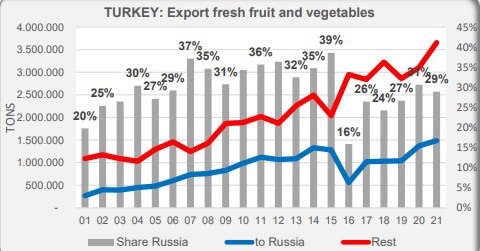
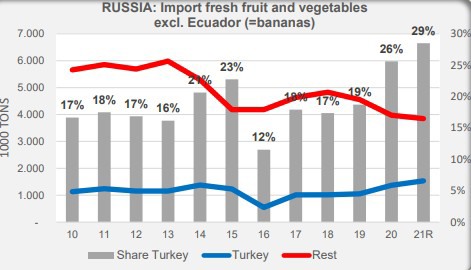

1.5 million tons from Turkey to Russia
Until the temporary and partial boycott of Turkish fresh fruit and vegetables in 2016, Russia's share rose to almost 40%. In 2016, this plummeted to 16%. In the meantime, Russia's share has returned to almost 30%.
Last year, Turkey exported almost 1.5 million tonnes of fresh fruit and vegetables to Russia. That was a record. Even more than in the hey days before the partial boycott in 2014, it was 1.33 million tonnes. In 2020 it was also more than that: 1.38 million tonnes.
Self-sufficiency in Russia stagnates
Conversely, as mentioned, Turkey is a very important supplier for Russia. In the past year, almost 30% of Russia's imports of fresh fruit and vegetables (excluding bananas) came from Turkey. Russia imports almost 7 million tons of fresh fruit and vegetables annually. Excluding bananas, in 2021 as in 2020, it was about 5.3 million tons. In 2018 it was 5.8 million tonnes and before the big boycott in 2014 7.1 million tonnes.
After the imposition of the "big" boycott in August 2014, the import of fresh fruit and vegetables (excluding bananas) decreased from 7.1 to 5.3 to 5.8 million tonnes, but the quantity remains fairly constant. This is confirmed by FAO production. The Russian production of vegetables has fluctuated around 14 million tonnes for years. The production of fruit is increasing, but only slightly, from 5 to 6 million tonnes. The ratio of production to imports has not really changed after the boycott in 2014. For fruit it has been around 52% production and 48% import and for vegetables 90% production and 10% import.
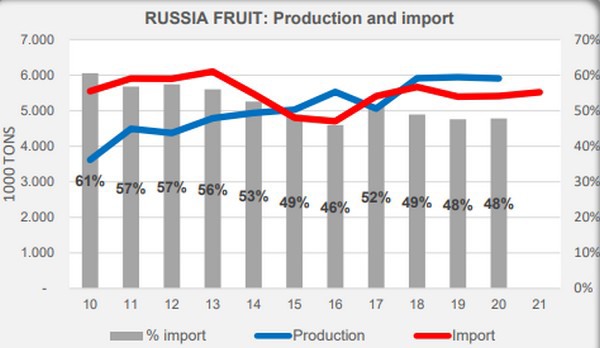
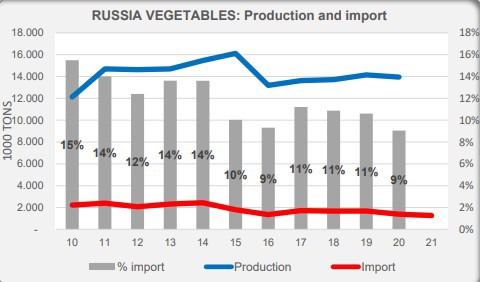
Many imports come from former Soviet republics and Egypt
For the import of fresh fruit and vegetables, Russia is therefore mainly (30%) dependent on Turkey. Other big suppliers to Russia are Azerbaijan (0.45 million tons in 2021), Egypt (0.41), Uzbekistan (0.35), China (0.28), Moldova (0.27), South Africa (0.27), Belarus (0.24 re-export Polish product?), and Morocco (0.16).
From now on, reality will look very different but we will have to wait and see how that will play out in the (import) figures.
Turkey is going to produce more and more
Turkey is becoming an increasingly important producer and exporter of fresh vegetables (excluding industrial tomatoes) and fruit. Particularly the production of fruit and protected vegetables is increasing. The total production of fresh vegetables now amounts to 29 million tonnes, of which over 20 million tonnes are grown in the open and 8.5 million tonnes in protected cultivation. The share of protected cultivation in 2021 was almost 30%.
But a small part of this large vegetable production is exported as a fresh product. Last year, the export share was no more than 5%. The production of fruit (excl. grapes for wine) was almost 24 million tons last year. The share of fruit exported as fresh produce is about 15%.
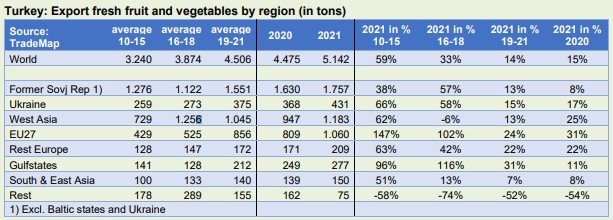
Tangerines, lemons and tomatoes in particular
Mandarins and lemons are the largest Turkish export products. The export of Turkish mandarins is heading towards a million tonnes and that of lemons has already exceeded the 0.6 million mark. Turkey hardly exports limes. The export of Turkish lemons has grown particularly rapidly in recent years. Tomatoes are the third export product with a quantity of over 0.6 million tonnes. Then apples (0.35 million tons), onions (0.27), grapes (0.26), oranges (0.26) and peppers (0.19) follow.
One million tons to EU
After Russia, Iraq is the second buyer of Turkish fresh fruit and vegetables. Last year, 0.73 million tin went there. Then follows Ukraine with 0.43 million tons, Syria (0.33) Romania (0.27) and Germany (0.19).
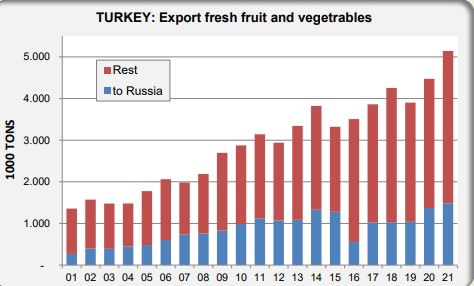
Click here for the full report
For more information:
Jan Kees Boon
Fruit and Vegetable Facts
+31 654 687 684
fruitvegfacts@gmail.com
www.fruitandvegetablefacts.com
